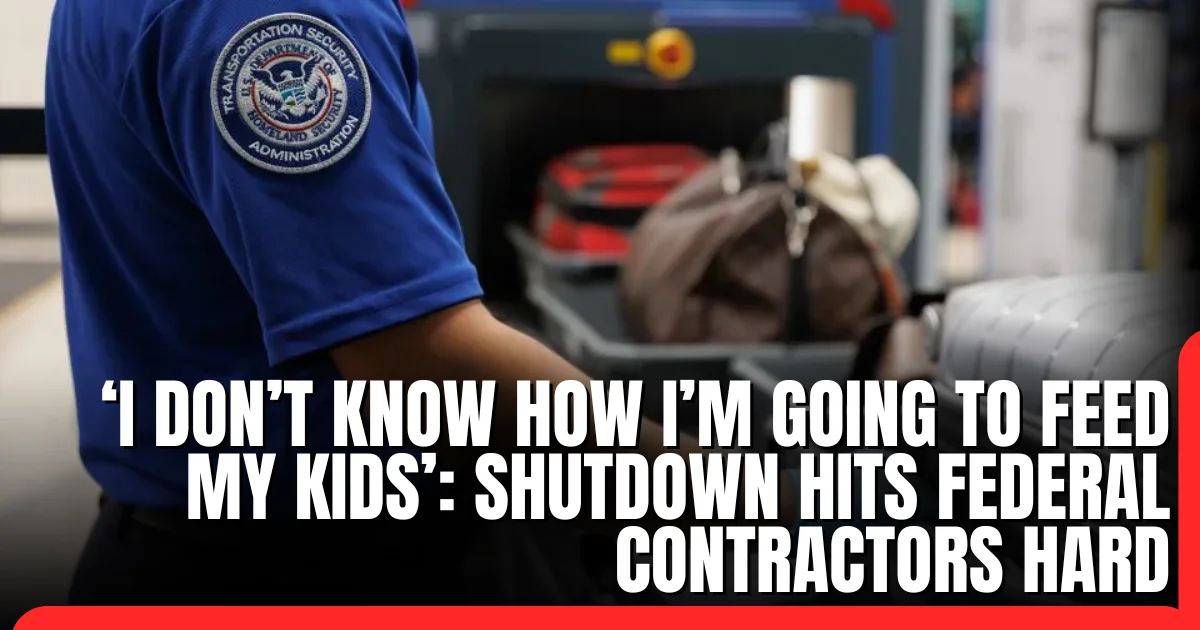Thousands of federal contract workers face lost paychecks as the government shutdown deepens. Here’s how it’s impacting families nationwide.
Table of Contents
👉 “I’m terrified I can’t feed my kids”: Government shutdown pushes federal contract workers to the brink
Introduction
As the U.S. government shutdown stretches into its first week, hundreds of thousands of federal contractors are caught in the middle — working families now unsure how to pay rent or buy groceries.
For many, including cleaners, cafeteria staff, and security guards, this shutdown doesn’t just pause paychecks — it erases them entirely.
When the Pay Stops, Fear Sets In
At the Smithsonian Museum of American History, cleaner Audrey Murray, 65, is bracing for the worst.
“I don’t know how I’m going to feed my kids or pay my mortgage,” she said. “We have families who depend on us.”
Unlike federal employees, contract workers rarely receive backpay once the government reopens. For low-wage employees like Murray, every missed paycheck deepens financial distress.
If the Smithsonian shutters operations after Saturday, Murray — a cleaner for nearly 30 years — will lose her only source of income.

Why Federal Contractors Don’t Get Paid
Shutdowns are painful for all federal workers, but the difference between employees and contractors is stark.
Federal employees are furloughed without pay but later reimbursed; contractors, who provide services such as janitorial, cafeteria, and security work, typically get nothing.
Labor advocates say most contract workers almost never receive backpay after a shutdown, leaving them financially stranded once the government reopens.
Since contractors are paid only when services are performed, closed buildings mean no work and no compensation.
This financial gap disproportionately hurts women and people of color, who make up a large share of the low-wage federal contract workforce and often have minimal savings to fall back on.
‘It Really Triggers Me’: Workers Scramble for Side Jobs

For Tiara Roberts, a single mother of three who works as a museum security guard in Maryland, the shutdown is devastating.
Roberts said the situation has become overwhelming, adding that the shutdown has piled additional stress onto an already difficult time.
Roberts plans to drive for Uber and deliver for Instacart to make ends meet while waiting for clarity from her employer.
Legal Experts: ‘You Can’t Make Up That Time’
Employment attorney Nichole Atallah of PilieroMazza LLP says that contract workers, especially in hourly or service roles, are rarely compensated after shutdowns.
“If you’re a cafeteria worker or a janitor, you can’t make up that time. It’s lost,” Atallah explained.
She recommends furloughed contractors apply for unemployment benefits immediately, as state systems in the D.C. area may face delays.
The Push for Fair Pay
The Service Employees International Union (SEIU) estimates that over 500,000 contractor employees went unpaid during the 2018–2019 shutdown — the longest in U.S. history.
To address that gap, Sen. Tina Smith (D-MN) and Rep. Ayanna Pressley (D-MA) have reintroduced the Fair Pay for Federal Contractors Act, which would grant backpay to low-wage contract workers, up to $1,442 per week.
“This is about fairness — contract workers shouldn’t lose pay because of a shutdown they didn’t cause,” Smith said.
Union leader Jamie Contreras of 32BJ SEIU urged the administration to prevent “punishing working-class families” who keep federal buildings running.
Administration’s Response and Political Blame

White House spokesperson Kush Desai called contract workers “another casualty of the Democrats’ needless and destructive shutdown,” without confirming whether the administration would support compensating them.
Meanwhile, Democrats accuse the administration of using working families as leverage in the ongoing budget impasse.
‘Not Fair’: Families on the Brink
For Maria Madonado, a single mother and contracted cleaner at the IRS headquarters, the situation is deeply unsettling.
“It’s not that we’re not working because we don’t want to,” she said through a translator. “It’s not fair.”
Madonado, a 26-year U.S. resident from El Salvador, fears applying for unemployment could jeopardize her path to citizenship amid the administration’s immigration crackdown.
“You think you’re more secure in a government job,” she said. “And today I realized that’s not the case.”
Why It Matters
Federal contractors represent a crucial yet often invisible part of the U.S. government workforce — the people who keep museums open, secure buildings, and serve meals.
As the shutdown drags on, their financial survival hinges not on their work ethic, but on Washington’s political gridlock.
The ripple effects could also hit local economies, as thousands of workers across D.C., Maryland, and Virginia reduce spending or fall behind on rent.

Click here – Can Trump Really Win a Nobel Peace Prize? Here’s How
FAQs
1. Do federal contractors receive backpay after a shutdown?
Usually not. Unlike federal employees, contractors are not legally entitled to backpay unless Congress passes special legislation.
2. How many workers are affected by the 2025 shutdown?
Union estimates suggest hundreds of thousands of contractors are without income, including janitors, cafeteria workers, and security staff.
3. What is the Fair Pay for Federal Contractors Act?
A bill proposed by Sen. Tina Smith and Rep. Ayanna Pressley to ensure backpay for contractors affected by shutdowns.
4. Can contractors apply for unemployment?
Yes. Legal experts recommend applying immediately, though some state systems may experience delays.
5. How long could the shutdown last?
The duration depends on budget negotiations in Congress. The 2018–2019 shutdown lasted 35 days — the longest in U.S. history.
Conclusion
As Washington debates budgets and blame, thousands of contract workers face empty paychecks and uncertain futures.
From museum cleaners to security guards, the message is clear: the cost of political gridlock is human.
Follow HNP Times for continuing coverage on the economic impact of the government shutdown and the fight for fair pay for federal workers.

